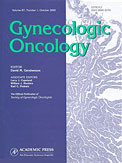Pluta M, Rob L, Charvát M, Chmel R, Halaška M Jr, Škapa P, Robová H. Gynecol Oncol. 2009 May;113(2):181–4. Epub 2009 Mar 4. IF: 2.614

Abstract:
OBJECTIVE: The purpose of this pilot study was to evaluate the feasibility and safety of a less radical surgery; laparoscopic lymphadenectomy followed by a simple vaginal hysterectomy in sentinel lymph node (SLN) negative early cervical cancer patients. Treatment-associated morbidity and oncological outcome were evaluated. PATIENTS AND METHODS: From December 2000 to September 2007, 60 patients (50 squamous and 10 adenocarcinoma patients) in stages 3-IA1, 11-IA2 and 46-IB1 with median age of 44.6 years (range 33–64 years) were enrolled. Patients were selected based on favorable cervical tumors (IA1 with lymph-vascular space invasion [LVSI], IA2 and IB1 with tumor size less than 20 mm and less than half of stromal invasion). All patients underwent laparoscopic SLN identification using frozen section (FS). Negative SLN patients underwent complete pelvic laparoscopic lymphadenectomy and vaginal hysterectomy. FS positive patients underwent radical hysterectomy with low paraaortic lymphadenectomy. RESULTS: The average number of sentinel nodes per side was 1.4 with detection rate per side of 95 %. The average number of removed nodes was 23.2. Five patients (8.3 %) were SLN positive. There were two false negative FS results (both were micrometastases in SLN). Median follow-up was 47 months (range 12–92). There were no recurrences in 55 SLN negative patients and in 5 SLN positive patients. CONCLUSION: Lymphatic mapping and SLN identification improved safety in less radical surgery in early stage cervical cancer. This preliminary study showed that it is both feasible and safe to reduce the radicality of parametrial resection for small tumor volume in SLN negative patients. Results also indicated that treatment-associated morbidity is low.
